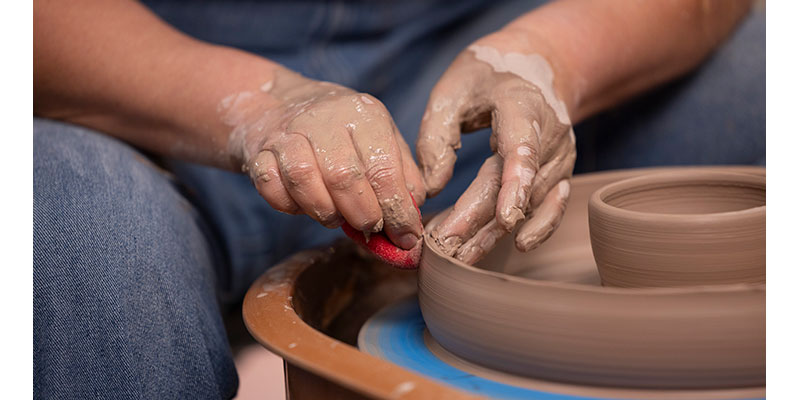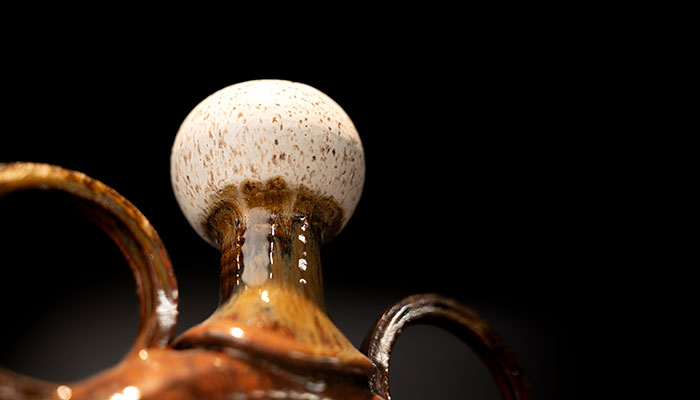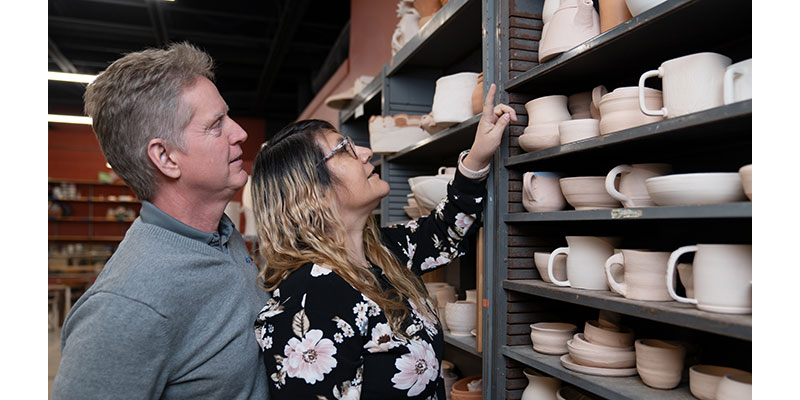Judith Hoge's passion for pottery helped her through melanoma treatment
contributed by Anna Megdell
Melanoma upended Judith Hoge's lifestyle. It also gave her the freedom to embrace her artistic side

Judith does ceramics at Yourist Pottery Studio in Ann Arbor. Judith is pictured above with friends at the studio.
Photo by Erica Reist Bass
It started with a mole the size of a penny.
In 2019, Judith Hoge told her doctor about a spot on her right leg that had been there as long as she could remember. “I wasn’t even worried about it,” Judith says. A few days later, after removing the mole and sending it to pathology, the doctor called. The mole had come back positive for melanoma.
The first surgery removed the mole and a surrounding lymph node. Under the care of Leslie Fecher, M.D., at the Rogel Cancer Center’s Melanoma Oncology Clinic, Judith continued to monitor the disease with scans every four to six months. Two years later, Judith discovered a lump in her right groin. A biopsy revealed a large metastasis. She underwent surgery to remove the cancer and all the lymph nodes from her right groin and abdomen and started oral therapy.
“I’m telling you, that recovery was tough,” Judith, 58, says, shaking her head. “I used to be very active. I’d workout three hours a day, I’d spin and do hot yoga.”
But after the surgery, Judith couldn’t walk and dealt with intense pain for months. “I felt like I was drowning,” she says. “That’s when I went full art.”

Photo by Bryan McCullough
Finding Shore
Judith is an artist. She’s been making pottery on-and-off since the mid-1980s back in Argentina where she grew up. When she moved to the United States in 2002, art was pushed to the background of her life, replaced with working, learning English and trying to survive in a new country. She’d take the bus from her apartment in Detroit to work in Madison Heights, a two-hour ride. On the way, she’d pass art galleries on Woodward Avenue and stare longingly at exhibits at the Detroit Artists Market. “I thought, someday, maybe, who knows, I could do that.”
Judith, who now lives in New Boston, MI, rediscovered pottery in 2015 but couldn’t take it as seriously as she wanted because of her job in retail. “I had all this creativity I couldn’t express,” she says.
As part of her recovery from surgery, Judith used resources from Rogel’s Patient and Family Support Services. “I grabbed for whatever I could to keep my head out of water. Therapy, art therapy, support groups.”
During a session with art therapist Sandra Drabant, Judith shared some of her pottery pieces. Drabant encouraged her to apply to the Voices Art Gallery to have her work featured in an exhibit at the University of Michigan Health Hospital. “Judith has passion, drive, determination and grit. Whenever she spoke about her pottery, her face and voice lit up,” Drabant says. “Her pots were so unique but also familiar at the same time—they were elegant and distinct. I knew they needed to be shared with the wider community.”
When Judith’s work was accepted to the Voices Art Gallery, she started to apply to more exhibits, and her work kept getting in.
“It was amazing,” Judith says, beaming. “I started to completely focus on pottery to deal with everything. I was doing awesome. I thought, ‘Yes, I can beat this.’ I felt like I was swimming to shore with the help of Sandra and the support group. I thought, ‘I’m almost there.’”

Photo by Erica Reist Bass
Reimagining Here
In September 2023, Judith began experiencing persistent headaches that at first were attributed to new glasses and stress over an upcoming pottery show. Her doctors ordered an MRI to rule out anything concerning -- an MRI that revealed a large metastasis. “She went to the doctor Wednesday, had an MRI Saturday, and had brain surgery the following Thursday,” her husband, Ron, explains.
“The thing is, I wasn’t scared about the brain surgery,” Judith says. “It all went so fast, I didn’t have time to think. And compared to the removal of my lymph nodes, it was nothing.” Judith was also focused on preparing for several art shows that fall. “Just three weeks after my surgery, I was going to the studio almost every date, trying to make inventory for those shows.”
Along with radiation, Judith started receiving monthly immune therapy infusions and carried on with her art shows. Just one week after the last exhibit, in December 2023, after intense dizziness, another MRI revealed a small inoperable brain tumor that was treated with radiation. “And here I am!” Judith says, laughing. “I am fully functioning. I am still here.”
To Judith, here means traveling with Ron, meditating daily while pumping the lymphatic fluid from her leg, finding safe ways to move her body, dancing and spending time with friends.
Since the removal of her lymph nodes, Judith will have lymphedema for the rest of her life. To manage those symptoms, she wears a compression garment and uses a pump for an hour twice a day. “They told me that if I don’t take care of it, the lymphedema will be progressive and I could lose my leg. I’m keeping up.”
Soon after the surgery to remove her lymph nodes, Judith and Ron traveled to the Dominican Republic. Because of the change in pressure during the flight, Hoge’s leg swelled “like a balloon” when they arrived at the resort. “But that didn’t stop me,” she says. “I was on vacation. I wasn’t going to sit in the hotel room.” Judith pauses, shakes her head. “I have to wear a compression garment that covers one and a half of my legs, every day. I thought I couldn’t wear shorts or skirts. I didn’t want people to look at me. But on that vacation, I said to myself, ‘Stop. Nothing has changed inside of you.’ This is me now, and this is going to be me. It might seem shallow, but it took time to adjust to my new life.”
Since that first vacation, the couple travel regularly, and have learned ways to manage lymphedema flares, including wrapping Judith’s leg before a flight and pumping immediately after. “Then we’re off to the races,” Ron says. “We made a choice that we weren’t going to let cancer eliminate the things from our lives that we love to do together but we do accept that they’re going to look different. For example, hikes might be shorter or take more time than usual, but we’re still going to hike.”

Judith with her husband, Ron
Photo by Erica Reist Bass
‘Sometimes Dreams Come True in Weird Ways’
Here also means pottery. Lots and lots of pottery. “When I make art, everything goes away,” Hoge says. “It’s just me and the pottery, me and the wheel. I feel free of everything. Pottery saved my life.”
In August 2023, Judith submitted her art to the Detroit Artists Market, the same gallery she’d pass on her bus ride to work over 20 years ago. “I got in,” she says. Months later, she volunteered to help decorate the gallery for Christmas. “I was hanging decorations and saw the buses go by on Woodward. I realized, ‘Oh my gosh, my dream came true.’”
Since those art therapy sessions years ago, Judith now regularly submits her pottery to shows across the country, and has no intention of stopping. “I was reflecting on my journey recently, and am so thankful to Sandra. She was the one who started this madness,” Judith says, laughing. “She encouraged me to apply everywhere and gave me all this confidence. She saw that I had something inside me. If I wouldn’t have had cancer, I wouldn’t have met Sandra. Cancer woke me up to the reality that most of my dreams have come true. Sometimes your dreams come true in weird ways.”
Judith is quick to clarify that she’s not talking about a silver lining. Cancer turned her life upside down and took her “to another dimension,” and she continues to live with its reality every day. But the connections made in the cancer support group and meaning found in art have showed Judith that she’s stronger than she thought. “I’m still here,” she says again. “I survived brain surgery. I’m still healing, but, what the heck, I am strong. I’ve learned how to love and accept myself. I’ve discovered I can go through things I never thought I could.”
At the studio, Judith embraces the wheel with expertise and a steady focus. She chats with friends and marvels at their creations. She dusts off her work on display, proudly. She talks about future projects, about pieces sold at a recent show. She laughs that the universe is on her side as she creates a perfectly balanced bowl from a wet block of clay. She is here.
Learn more about art therapy and other support services
Contact the Art Therapy Program at 877-907-0859; or visit the art therapy webpage.
Visit the Complementary Therapies webpages.
Continue reading the 2024 issue of Thrive
